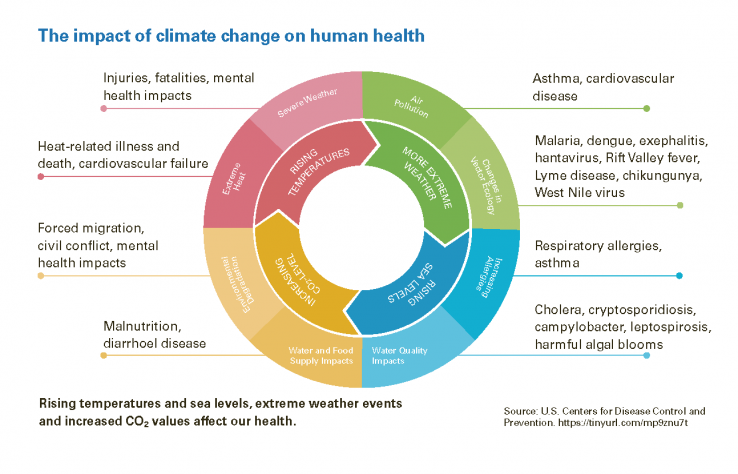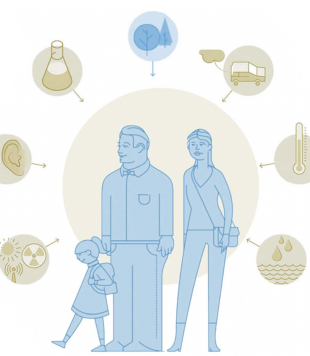
Climate change: Healthcare systems are part of both the problem and the solution
Sep. 2022Environment and health
Climate change is affecting our health. Heatwaves, the spread of infectious diseases and ozone pollution are just some of the risk factors. The effects are already perceptible in healthcare provision, yet at the same time our healthcare system is having a not inconsiderable impact on the climate. As part of its efforts to protect health, the FOPH is implementing the “Adaptation to climate change action plan, 2020–2025”.
“The earth has a fever, and it is rising”, said US politician and climate activist Al Gore in 2007. The truth of his words is becoming ever more perceptible. Without climate protection measures, the CH2018 climate scenarios for Switzerland predict that average yearly temperatures will rise by a further two to three degrees by the middle of the century. With systematic climate protection, however, two thirds of the potential climate impact could be avoided until 2060.*1
Overall public health affected
Even now, extreme weather events such as heatwaves or floods are occurring with greater frequency. They are also impacting our health. There is good reason why climate change has been called the biggest global health threat of the 21st century.*2
Climate change has both a direct – say through heat or smog – and indirect – by changing ecosystems – impact on our health. It affects noncommunicable conditions such as cardiovascular disease, transmissible diseases such as respiratory tract infections and also mental health, for example by triggering stress. Climate change, including loss of biodiversity, is therefore a priority in the “Environment and Health Roadmap” that the FOPH is currently drafting in partnership with the Federal Office for the Environment FOEN.
Driving CO2 emissions
Healthcare systems have conflicting roles in the context of climate change. While they provide treatment for climate-related diseases, they are also a significant source of greenhouse gas emissions. According to estimates, Switzerland's healthcare system is responsible for 6.7 percent of the country’s total CO2 footprint.*3 “This is perhaps ironic – as medical professionals commitment is to ‘first, do no harm’”, said Tedros Adhanom Ghebreyesus, Director-General of the World Health Organization (WHO), commenting on the issue. “Places of healing should be leading the way, not contributing to the burden of disease.”
The “Green Hospital” research project funded by the Swiss National Science Foundation (2018–2022) has investigated this issue, identifying hospital processes that impact the environment and which have potential for improvement. The areas with the biggest savings potential in terms of greenhouse gas emissions are energy supplies (heating: 26% savings potential in an average hospital, electricity: 9%), catering (17%), building infrastructure (15%) and medicines (12%).*4 Catering in particular is an area where steps can be quickly and easily taken, for example by serving meat less often.
Solutions are cross-sectoral
The effects of climate change are not just limited to healthcare provision, but they are also closely linked to other areas such as food safety, natural hazards, agriculture, energy, etc. For this reason, the Confederation is endeavouring to find cross-sectoral solutions. The Federal Council established the framework for coordinated action in 2012 with its “Adaptation to climate change in Switzerland” strategy. Implementation between 2020 and 2025 is covered by the second action plan. The FOPH is involved in this plan too, acting as lead agency on measures to protect human health. These include providing information and recommendations on heat stress or monitoring, preventing and recognising early signs of infectious diseases transmitted by mosquitoes, for example.
The FOPH is also contributing to the Confederation’s National Centre for Climate Services (NCCS). It is lead agency for the “Human health” priority theme, on which it is partnering with FOEN, the Federal Office for Civil Protection FOCP, MeteoSwiss and Swiss TPH. In addition to providing information for professionals, authorities and the public, scientific principles and prevention measures are also being developed. These will be published via the NCCS priority theme “Human health”.
The NCCS programme “Decision support for dealing with climate change in Switzerland” (2022–2025) will generate further findings. One of the six projects in the programme, “Human health and animal health”, is a joint project between the FOPH and Federal Food Safety and Veterinary Office FSVO.

Links
- Heat (FOPH, in German)
- National Centre for Climate Services NCCS
- Climate Scenarios for Switzerland CH2018 (NCCS)
- Human health (NCCS)
- “Adaptation to climate change in Switzerland: Action plan 2020– 2025” (FOEN, in German)
- “Health Care Without Harm”
- “Green Hospital” (NRP73, in german)
- European Climate and Health Observatory




